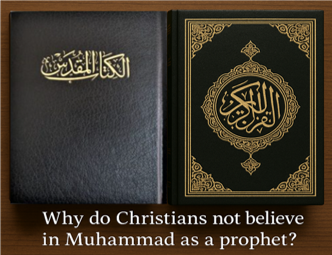
This is a very important question that often comes up in dialogue with Muslim friends: “We Muslims believe in Jesus. Why don’t you Christians believe in Muhammad?”
A Biblical response should be given in truth with gentleness and respect (1 Peter 3:15), while explaining the essential difference in how Jesus and Muhammad are viewed in the Bible.
1. Jesus is Not Just a Prophet — He is God’s Son and the Final Revelation
- Muslims believe Jesus (ʿĪsā) was a great prophet, but not God.
- The Bible teaches that Jesus is more than a prophet—He is God in the flesh (John 1:1, 14), the Savior of the world (John 4:42), and the final Word from God (Hebrews 1:1–3).
“In the past God spoke to our ancestors through the prophets... but in these last days He has spoken to us by His Son…” — Hebrews 1:1–2
From a biblical perspective, God’s final words were spoken through Jesus. There is no need for a prophet to come after Him with a new revelation, including Muhammad.
2. Jesus Warned Against False Prophets After Him
Jesus Himself warned that many false prophets would come after Him, leading people away from the truth (Matthew 24:11, 24).
“For false messiahs and false prophets will appear and perform great signs and wonders to deceive…” — Matthew 24:24
The apostles also warned that anyone who preaches a different gospel (a message of salvation that contradicts the true one) is to be rejected (Galatians 1:6-9).
*- Muhammad taught a different gospel that denies Jesus as the Son of God, denies His crucifixion (Sura 4:157), and denies His deity. From a Biblical standpoint, this contradicts the core truth of the Gospel.
3. The Bible Does Not Predict Muhammad
Muslim apologists often claim that the Bible predicts Muhammad in verses like Deuteronomy 18:18 or John 14:16. However, careful study shows:
- Deuteronomy 18:18 refers to a prophet from among the Israelites, not from outside (Muhammad was Arab, not an Israelite).
- John 14:16 refers to the Holy Spirit, not a human prophet.
So, there is no Biblical prophecy about Muhammad. The Bible does not point to another prophet after Jesus.
4. True Belief in Jesus Means Accepting Who He Really Is
Muslims say they “believe in Jesus,” but the Jesus of the Qur’an is not the Jesus of the Bible.
- Islam denies that Jesus is the Son of God (Sura 4:171).
- Islam denies His death and resurrection, which is the foundation of salvation in Christianity (1 Corinthians 15:3–4).
“If you do not believe that I am He, you will die in your sins.” — John 8:24
From the Bible’s view, it is not enough to believe Jesus was a prophet—we must believe in Him as Lord and Savior.
Summary:
|
Muslim View |
Biblical View |
|---|---|
|
Jesus is a prophet |
Jesus is more than a prophet and messenger. God’s Son, Savior, and final revelation |
|
Muhammad is the final prophet. |
Jesus is the final Word; no prophet with a new message is needed after Him. |
|
The Qur’an continues the revelation. |
The Bible warns against any other gospel or prophet whose message does not align with that of Jesus. |
|
Jesus was not crucified. |
Jesus’ death and resurrection are central to salvation. |
So …
-
Yes, we both, Christians and Muslims, honor Jesus - but we must be honest about who He truly is.
-
We do not accept Muhammad as a prophet - not out of disrespect, but because the Bible, which we believe is God’s Word, teaches that Jesus is the final and complete revelation of God.”
